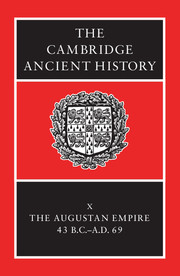13b - Sicily, Sardinia and Corsica
from 13 - The West
Published online by Cambridge University Press: 28 March 2008
Summary
Shortly before his death in 44 B.C. Iulius Caesar granted Latin rights (Latinitas) to all free-born Sicilians. Cicero, to whom we owe this information, clearly did not approve of the grant, still less of Antony's conversion of it into full citizenship in March or April 44, on the dubious pretext that such had been Caesar's intention; for, despite being a Roman province for close on two hundred years (‘the first to teach our ancestors what a fine thing it is to rule over foreign nations’, as Cicero put it), Sicily remained at the time of the late Republic a fundamentally Greek island. Italians had of course been involved there as landowners or negotiatores in considerable numbers from at least the second century B.C., forming themselves in ‘conventus civium Romanorum’ outside the administrative jurisdiction of the Sicilian towns. Very few Sicilians had been granted Roman citizenship, the evidence of Cicero yielding only some fourteen names, and of two possible novi homines in the Senate who came from Sicily neither are likely to have been Sicilian Greeks by birth. Latin in the province was still a foreign language spoken and understood by a tiny minority: Cicero has to remind his audience that the Syracusans call their curia the bouleuterion, expound in detail the Greek calendar system still in use throughout Sicily, and explain Sicilian usage of Greek words in the documents read out in court. Latin inscriptions of republican date are rare (and in any case set up either by Italian immigrants or by the provincial administration), and the city constitutions were still those of the hellenistic Greek world, with decrees issued by ‘the council and the people’ (η βουλη και ο δημος), and with magistrates bearing such titles as prostates, strategos and agoranomos.
- Type
- Chapter
- Information
- The Cambridge Ancient History , pp. 434 - 448Publisher: Cambridge University PressPrint publication year: 1996
References
- 2
- Cited by



